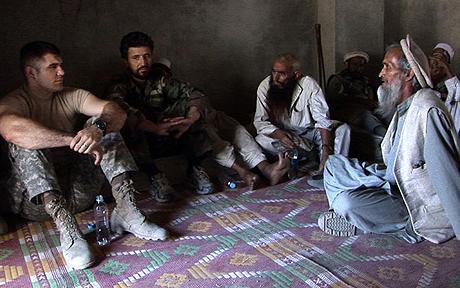'Restrepo' reveals what our soldiers face in Afghanistan

In the documentary film 'Restrepo', viewers experience what a deployment in one of the most deadly parts of Afghanistan actually feels like. We follow soldiers of the Second Platoon of an Army Airborne unit on their 15-month deployment to the barren, forbidding Korengal Valley of Afghanistan beginning in 2007. Their exploits were filmed and edited by 'Perfect Storm' author Sebastian Junger and prize-winning photojournalist Tim Hetherington (killed earlier this year in war zone action) into a raw, unfiltered look at the challenges and tragedies overcome by American soldiers in this formidable land that has withstood assaults by one enemy after another over centuries of conflict.
It is inevitable that the victories these soldiers achieved would be pyrrhic in nature. The U.S. military eventually abandoned the Korengal Valley despite the wrenching loss of lives, including PFC Restrepo for whom the film as well as the hard-won and highly-successful featured outpost was named.
There are many searing images in this documentary, as well as numerous frames showing the real life boredom that soldiers endure between action. But none struck me harder than the uncomfortable scenes when a sincere but ill-prepared captain met with Afghan elders in an effort to win hearts and minds.
It made my skin crawl as I watched and listened to this officer tell these bearded elders that we were simply trying to offer them a path to greater wealth by freeing them from the Taliban. There was not a flicker of understanding of the concept of personal wealth in the eyes of the Afghans. Their cultural norms were unknown to American soldiers asked to wage a propaganda war along with a shooting war.
The one real opportunity we had to make a financial difference to the Afghans was to compensate them for a cow that we had killed because it had entangled and badly injured itself in some of our barbed wire. When headquarters refused payment and offered some canned goods instead, the Afghans walked away in disgust. Yet, we were willing to fire off endless rounds of armaments from the ground or by air at the first sign of the enemy. The cost of one cow could not have represented more than the first few moments of such a skirmish. We proferred riches to people with no understanding of or care for them, but refused compensation for something they understood viscerally -- one dead cow.
We all cannot visit Afghanistan to see what is happening there, but we all can rent this gritty film and gain something more than a nightly news soundbyte version of truth.
*On an unrelated note, here's a follow up on my Kings Beach series: There is now evidence of a growing resistance to the bio-mass plant on the streets of Kings Beach. More signs, more professionalism, and more substantive content including calls for the plant to be sited at Cabin Creek in Truckee rather than the middle of a residential neighborhood in Kings Beach. The people of Kings Beach are aware and engaged.



